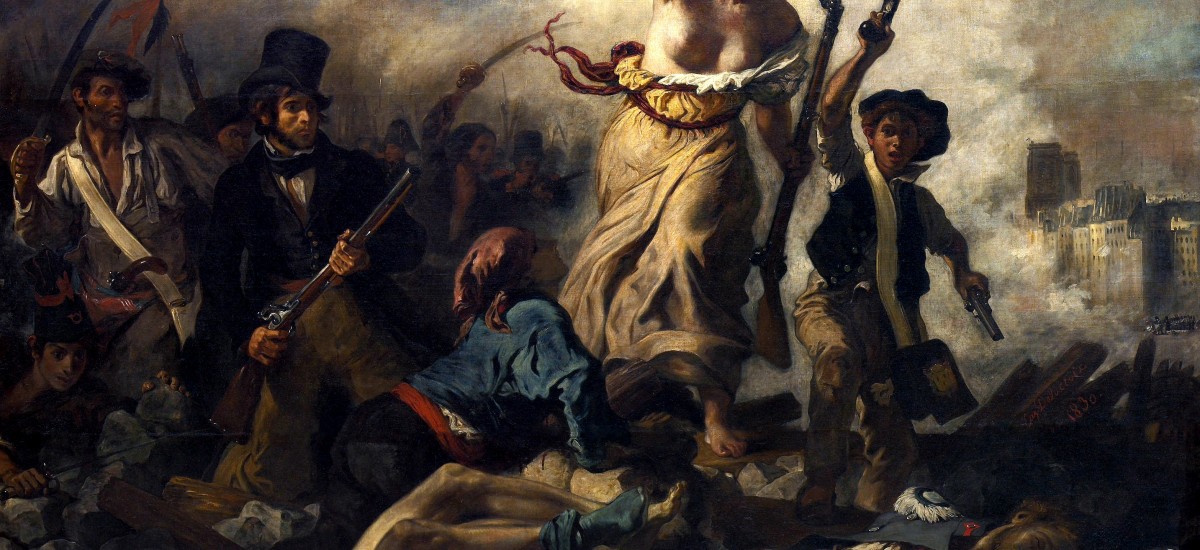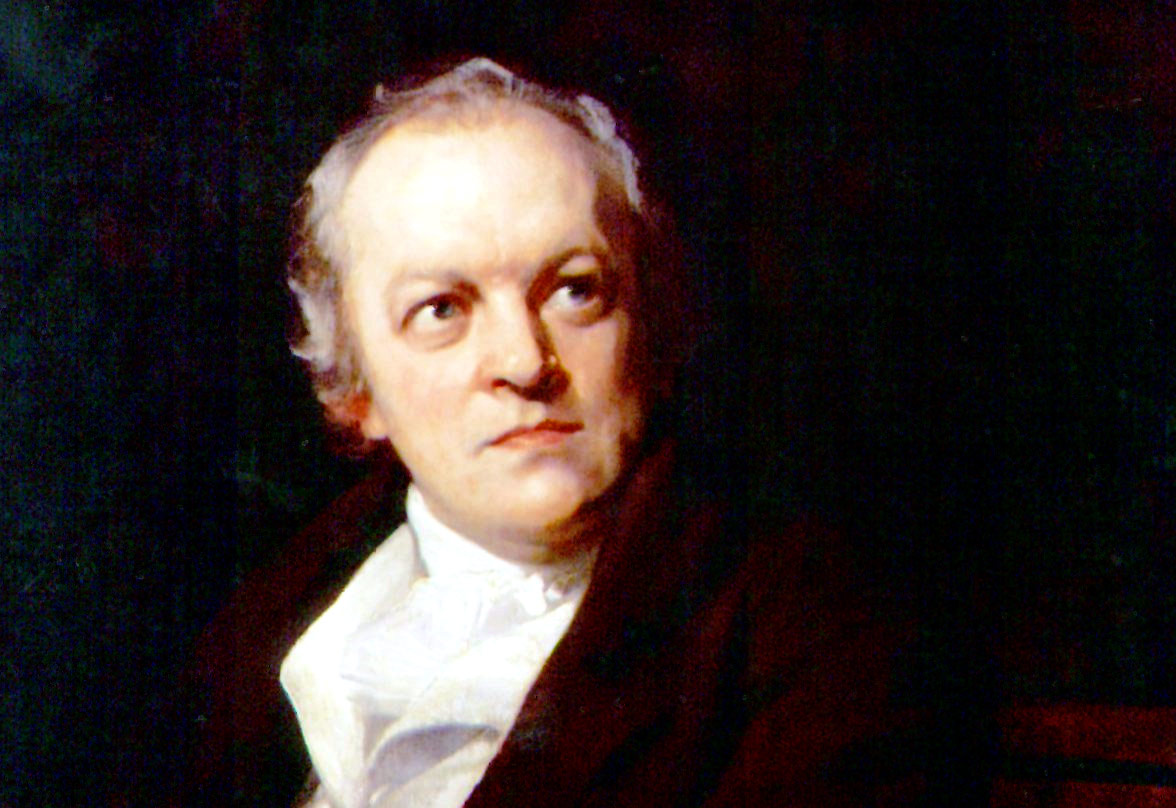[William Blake 1757-1827 demonstrated through his art and poetry how opposite views were actually relative and dependent on each other and that they were reconcilable once we overcame the mental trap of ‘abstraction’ and solidification, the act of removing something out of its context and turning it into an absolute]
[The Asokan pillar is a symbol of fearlessness that emerges through non-violence and the ability to work through and overcome negative emotions. Fear is the prime cause behind abstraction.]
[Blake found that Thomas Paine’s defense of the French Revolution (Rights of Man) and Edmund Burke’s critique of it (Reflections on the Revolution in France) valid perspectives, yet polarized – the former on the side of energy and the latter on the side of reason; they both had to be moderated and harmonized to attain a balanced view.]
When revolution becomes the establishment
Scholarship implies detachment. And yet many scholars end up more attached than ever to their theories and frameworks. In both Buddhism and Human Rights, pioneers developed their thought and action within the crucible of life and left rich legacies for succeeding generations. Once they became sources of formal power they both underwent a fundamental change of character. What was once the revolution became its anti-thesis; the solid establishment. Understanding this shift is vital to making sense of both Buddhism and Human Rights in Sri Lanka today.
Both systems of thought made their entry through the front door. However, while Buddhism was integrated and internalized to produce a local praxis the same cannot be said of human rights. Buddhism modified the substance of power – redefining it for those who wielded it including kings and nobles. In theory human rights can be said to have done the same for our politicians and officials. In practice integration and praxis was by-passed and the concept fast tracked into an ideology (or another system of thought) which can be used, abused or ignored at the pleasure of those in power.
Human rights today, has fallen into a trap that Buddhism fell into in the first centuries succeeding the Great passing of the Buddha. As the Theravadin Monks or Elders began the task of formalizing and systematizing the Buddha’s teachings into a code the familiar enemy – “attachment” raised its head.
Jonathan Roberts’ excellent reader on William Blake’s poetry refers to the way that any quest for a higher truth or moral scheme (whether this is based on religion or a secular ideology like capitalism or communism) can be a source of temporal power.
“Blake thinks that the problem arises because these abstract schemes seem to exist beyond space and time, and therefore no longer need to take account of the particular situation of individuals: these abstractions put themselves ‘above’ or ‘beyond’ the human, beyond the contingencies of individual lives.”
A new reality was constructed over the direct and demanding practice of self cultivation. What the Buddha taught his disciples to observe and let go the Theravadin elders reduced to writing and this became a prized possession. The concept was celebrated. Reality became increasingly insignificant in popular practice.
What is praxis?
By praxis I refer to a relationship with actuality. There is an uncompromising search for the real self; for real others and for real facts and situations. This can be illustrated with three different responses to a case of murder. The state provides a rational and un-emotional response by dealing with the ‘criminal’ through the ‘criminal justice system.’ This is one escape from reality into a constructed reality. There is another escape which may happen if a relative of the deceased takes a gun and shoots and kills the murderer. This may be an irrational and emotionally dominated response. Can there be a moderate and practical approach that avoids these extremes? That is an approach that seeks to help – the family of the deceased who are left behind and one that responds to an ever changing reality. This kind of ordinary support may also be referred to as social work. In a country that is very much in the throes of a social crisis, where so many children, men and women have become isolated and alienated without human care and relationships there is very little priority given to social work. Individual rights of children, women, elderly the sick and disabled are all receiving separate attention. But there is no unifying focus on that requisite social skill, practice and discipline that needs to be at the heart of all these efforts.
Dropping dogmatic certainties to seek an engagement with things as they are requires courage. Our situation on earth is well summarized in this “Truth no. 37” from a laundry list of eternal truths:
We must live within the ambiguity of partial freedom, partial power and partial knowledge.
A praxis therefore seeks a middle way between absolute knowledge and absolute ignorance. And it has plenty of room there for collaborative insights.
Worshipping at new temples
Human rights practice in Sri Lanka is not focused on creating power where there is none. It is simply inviting the poor, suffering and oppressed to go and pray at different temples of the establishment. One such new temple is the Human Rights Commission in Colombo and the other the Supreme Court. For those who can afford it there are temples abroad as well – notably in Geneva. And because there is no thoroughgoing approach and strategy to generate new power it has become politically insignificant, impotent and irrelevant.
Paper rights in exchange for freedom
This is not surprising in the least. The colonized people of this country had their freedoms taken away and their natural economy and social systems removed. In return they were given rights on paper. While the common man was holding on to this piece of paper social realities caught up with and finally replaced the British inspired system. Consequently the hierarchical, paternalistic and feudal nature of society has replaced what was initially conceived as an impartial state. Society and state today are one – not two.
In short, human rights has simply not developed into a praxis here. At the same time there is a great push from the international arena at an ideological level to make up for this absent praxis. This approach is widely held across organizations that champion the rights of vulnerable groups. More recently it has been adopted by those who seek justice for war crimes committed at the closure of the Eelam War. Unfortunately these approaches seem to lack an understanding of the weaknesses that all ideologies share – especially when their proponents are ideologically driven – as opposed to being empirically and relationally grounded.
Understanding dualism
One of William Blake’s key themes was to demonstrate the inter-dependence of apparent opposites. Thus categories like good and bad, day and night, criminals and victims were not absolutes but simply terms of relations. We identify good because of bad; day because of night and the victim because of the criminal. These are all valid impressions within the given context where the relation is in issue. The next point is that our context is always changing and does not remain fixed. When we refer to a mountain or river it may be sufficient to simply name them. However this name is just a summary, a short hand for a million realities – all of them subject to continuous change from moment to moment. The only difference is the question of degree as the mountain is composed of more solids while the river is composed of more fluids. One may seem still and the other the epitome of change itself. But this is simply an external or superficial impression.
Low engagement society
If our engagement and sensitivity is low the concept or label may suffice. However if we are seeking a more in depth understanding of the meaning of what is good and bad and who is a criminal and who is a victim we could go into the kind of exploration that Fyodor Dostoyevsky entered to write his classic Crime and Punishment in 1866.
It is difficult enough like the great Russian author did, to move into the alienated soul of a murderer; our predicament however, is that we are unable to step into our own shoes.
Despite the earth shattering experiences that our people have gone through in this era of violence we remain a low engagement / insensitive society. Of course we are highly politicized and contentious but these arguments are at a solidified and conceptual level. They are largely superficial and thus irrelevant. The Eelam War was based on a million realities; but it was ultimately fought on a simple “api venuven api” ideology. This was sufficient for people on both sides to kill and destroy total strangers and communities with great belief in the rightness and justice of their actions.
All wars are based on social distance; they are fought on the basis of fixed and absolute categories which are abstracted from reality. Wars and conflicts are a hall mark of a low engagement society. The question for us is how we can escape from this trap and move up to a higher level of engagement. For this we must relate directly to each other as human beings. There needs to be – not just a conditional acceptance but a great acceptance. This is our starting point. We are what we are; and we have all travelled many miles to get here.
Dynamism of contraries and shutting down the dialectic
Roberts provides the following window to the thoughts of Blake on the futility of de-valuing or rejecting one half of a pair of contraries.
Blake’s point is that we solve nothing but only cause suffering by trying to negate one half of a contrary. Our aim should be to bring the two halves of any aspect of existence back into relationship, which is why he writes books with titles such as Songs of Innocence and Experience, and The Marriage of Heaven and Hell. This does not mean neutralizing the nature of contraries, rather it does mean recognizing their respective characters and differences without needing to attach moral labels to them. Blake clarifies this central tenet of his thought by distinguishing a ‘contrary’ from a ‘negation’. Contraries are necessary to the existence of the world, but individuals and societies use contraries as a way to split the world in two morally. This moral splitting and categorizing is what Blake calls ‘negation.’ Negation is the process whereby one half of a pair of contraries is labeled as inferior to the other half and consequently dismissed.
A government that crushes political dissent, silences opposition and imprisons or executes critics is engaged in the attempt to negate experience. A negation is a zero – value or devalued contrary, which for Blake does not actually exist, because it is an abstract image of the world that no longer corresponds to reality itself: (Emphasis added)
Attractive, simple and convenient black and white arguments are presented in this way to create social power and generate a social consensus for moral schemes. There is a version of human rights activism which has taken this route in Sri Lanka – notably in relation to child abuse and violence against women where enormous funds are spent on trainings for police and judges and the maintenance of the criminal justice system. (Work that has involved direct assistance and support for victims constitutes the exception to this and the praxis of victim protection lies there).
Roberts shows how vested interests in society use indirect justice for their own advantage and power with very little ‘trickling down’ to the actual victims and their families and communities.
Here Blake is arguing that both reason and energy are necessary and interdependent, but that the ‘religious’ try to split them apart, confusing them for ‘good’ and ‘evil’. In other words, the conservative powers that govern Blake’s society call reason ‘good’ (because it maintains their own interests in the status quo) and energy ‘evil’ (as it threatens revolution, upset and change.)
Critique of ideology
This approach of the powerful generally resonates with the needs of the powerless for certainties and stories in which they can find solace. Words like ‘terrorism’, “rape”, “crime” and “child abuse” evoke emotive reactions for which the black and white approach provides a quick and appealing exit route. The incident is abstracted from the context to provide a “super concept” or grand idea for a new moral scheme. This is the way that mankind has moved from one ideology to another; from religion to secularism, from feudalism to capitalism, from capitalism to socialism and finally to totalitarianism after 9/11 in this new repressive and unstable age of emotions.
Blake has given us three characteristics of ideologies.
- They are general and therefore transcend or stand above human particulars in an effort to reach a super human objectivity. They are therefore abstractions.
- These abstractions depend on narratives which are ordered explanations of the nature of things. According to Roberts ‘cosmology, capitalism, geometry and theology are all narratives….narratives are not and can never be, transparent media; they create – or at least modify – the reality that they explain.’ We could easily add the law, government and human rights into the same basket.
- They are unavoidably human. It always takes a human being to create or describe any abstract scheme even if that scheme itself may deny this dependency and claim to be objective.
Roberts states:
Abstraction is always non human in Blake; human life always exists in what Blake calls ‘minute particulars’. This is one of the most important conflicts in his work, and the refusal to subjugate the human perspective to ‘higher’ schemes is a hallmark of his art.
Transient phenomena in praxis thus become solid entities in ideology. However it is not always appreciated that the root of all ideologies is a particular view of self.
Green earth forgets…
Recently, I heard a top official from the Ministry of Economic Development give the following example of the way animals fail to and human beings succeed in developing the fundamental idea of ‘self.’
When ducks fight they make quite a pandemonium; but their energies are exhausted by the fight and once it is over they resume their lives paddling serenely up and down the water. If two human beings have a fight they continue to suffer mentally for a much longer time and they will each have their subjective narratives about it.
If we apply Blake’s threefold characterization of ideologies we can see that our belief in a self is also a generalization that is supported by a dead past – which is our own ‘story’ based on a load of subjective perceptions. This is the starting block for all ideologies. The English historian G.M. Trevelyan wrote as follows about the ancient conflict between Anglo-Saxons and Scandinavians and how time was able to heal its bitter wounds:
So long as the Viking battle axe was crashing through the skulls of monks, and the English were nailing to their church-doors skins flayed off their Danish enemies, the hatred between Anglo-Saxon and Scandinavian was profound. But it was not permanent. In days before the printing-press, the memory of inter-racial wrongs and atrocities were not artificially fostered. Green earth forgets – when the school master and the historian are not on the scene. And these two Nordic races were of kindred stock, with many instincts and customs in common.
Conclusion
We in Sri Lanka have many school masters and many historians and very few of them would pass the test of detachment. Truth no. 1 in the list I referred to earlier states very eloquently that “This is it! – there are no hidden meanings.” We must learn to accept that there are multiple realities and multiple readings in a society. This is so even in societies which may for the time being adopt slogans like “one country – on voice”. I have not taken the side of praxis against ideology. In a human society we will find both. It is because of my reading that there is little praxis in Sri Lanka today that I emphasize this aspect more. These are simply references to action and thought and they are ultimately inter-dependent. What is most important is engagement. Approaches to victims of society which are based on a sense of concern and even a sense of solidarity with them are not going to be effective unless rooted in their lives and realities.
The goal of all development is nothing more than the engagement of people on a foundation of reality. The people must be truly involved if they are to evolve. The lesson of British colonization was that development that does not include all the people cannot be sustained. The same lesson continues to be relevant today.




